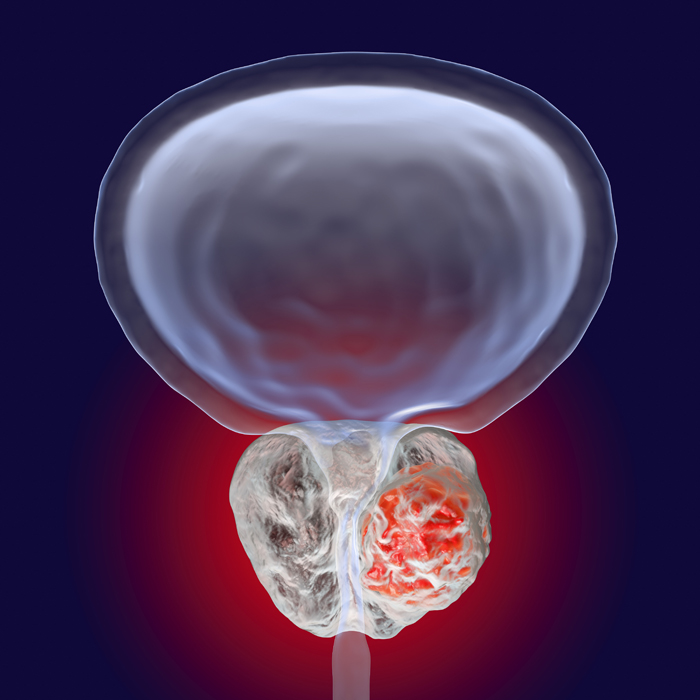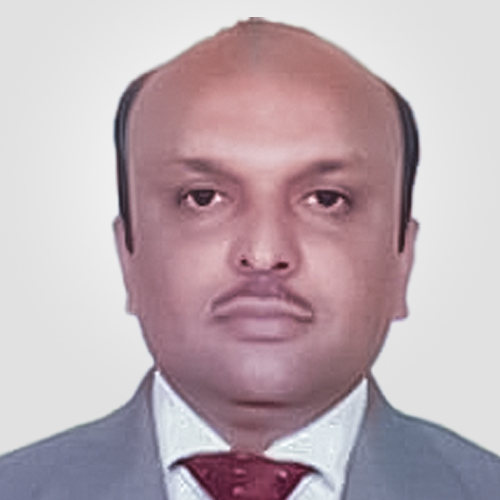Prostate Cancer Treatment & Diagnostics in Tardeo, Mumbai
Prostate Cancer
Human bodies are made up of millions of cells which come together to form organs. Generally, these cells multiply by a process called mitosis which involves splitting of one cell into two similar ones. However, on mutation or due to an abnormality, some cells start multiplying and increase exponentially in number. Since these cells are mutant forms, in some cases they start affecting the normal functioning of the nearby cells, tissues and/or organs. These masses are known as cancerous cells.

What is prostate cancer?
Located between the urinary bladder and the penis, the prostate gland is a vital part of the male reproductive system. It is responsible for producing and secreting fluids that help in protecting and nourishing sperms produced in the testes. This fluid is squeezed into the urethra to aid ejaculation of sperms stored in seminal vesicles forming the semen.
While there are certain conditions in which its functioning gets compromised, prostate cancer is one of the top three abnormalities associated with the gland. It affects some cells or the complete gland making it cancerous. It also happens to be the most common form of cancer in men, apart from skin cancer.
To seek treatment, you can search online for prostate cancer doctors near me. Or you can avail of prostate cancer treatment in Mumbai.
What are the symptoms of prostate cancer?
Early symptoms of this type of cancer include change in urination patterns, especially at night due to a weak urinary stream, followed by erectile dysfunction and painful ejaculation. One can occasionally observe drops of blood in urine or semen.
At an advanced stage, a man can experience pain in the hips, lower back or other areas if cancer is spreading to the bones. Additionally, some patients also observe loss of bladder or bowel movement in case the cancerous cells are pressing on the spinal cord.
What causes prostate cancer?
Currently, there are no specific reasons why prostate cancer occurs. However, men aged around 50 are said to be at a higher risk of developing tumors in the gland. Further, occupations that involve higher and prolonged exposure to any kind of radiation can also lead to deformity in the cells turning them cancerous. Additionally, men who are undergoing chemotherapy or radiation therapy for other types of cancer are also at the risk of developing prostate cancer. Alternately, there are chances of inheriting mutated genes from previous generations that cause cancer in progenies.
Can prostate cancer be prevented?
Till date, there are no proven ways of preventing prostate cancer. But one can certainly reduce the risk of prostate cancer by opting for healthier food and life choices and incorporating exercise in his or her daily routine.
When do you need to see a doctor?
In most cases, prostate cancer can go unnoticed for a very long time. However, if you notice drops of blood in urine or semen or experience frequent painful urination or bladder leaking and/or are unable to keep an erection, then you must consult a medical practitioner.
You can request an appointment at Apollo Spectra Hospitals, Tardeo, Mumbai.
Call 1860 500 2244 to book an appointment.
How is prostate cancer treated?
With the advancement of science and medicare facilities, prostate cancer can be treated without invasive surgeries. Some of the most commonly prescribed treatments include localized radiation therapy, hormone therapy, cryotherapy and chemotherapy. In some cases, doctors will advise you to wait for some time and monitor the progression of cancerous cells. This is known as active surveillance.
Radical prostatectomy or surgical removal of cancerous lump is mostly suggested for patients at advanced stages of the cancer. In this surgery, the doctor removes the entire mass of cancerous cells along with the gland and surrounding tissues from the seminal vesicle as well. In recent years, technology has advanced to such a level that doctors are able to perform comparatively less intrusive surgery using a robotic machine with arms known as robotic or laparoscopic prostatectomy. If a surgeon is well-trained, s/he can perform the surgery with minimal incisions and less blood loss and pain, ensuring comparatively faster recovery.
Such treatment options are available in prostate cancer hospitals in Tardeo
What are the risk factors and complications?
Just like any other surgery, the risk factors associated with prostatectomy are:
- Adverse reaction to anesthesia
- Excessive blood loss
- Infection at the surgery site
- Damage to nearby organs
Additionally, in rare cases, surgery can cause damages to the intestine leading to abdominal infections.
While the surgery is straight-forward and does not leave room for complications, there are some potential side effects of prostate cancer treatment. Since the treatment involves removal of the gland in entirety, it can have an adverse impact on a man’s libido and affect his sexual life for future.
Conclusion
In a nutshell, the prostate gland is one of the most vital organs of the male reproductive system. As per a study, it is suggested that 1 out of every 7 men will be diagnosed with prostate cancer in their lifetime. While there are no specific causes, it is better to follow a healthy lifestyle to keep the organ in a healthy condition.
The process of getting an erection and ultimately an orgasm involves active participation of various nerves and parts of the male reproductive system. As the cancer progresses, there are chances that the cells will start impacting the nearby organs causing difficulties in attaining and maintaining an erection.
In most cases, doctors will advise you to undergo active surveillance to monitor the progression of cancer cells. However, for some patients experiencing progressive cancer, undergoing medical procedures to avoid complications at later stages is recommended. Although, after a certain age, invasive surgery can become life-threatening in which case patients are advised to undergo alternative treatments for the same.
Treatment for prostate cancer involves exposure to radiation therapy at an early stage which will impact the quality of sperms. Hence, you can save the sperm in cryogenic banks that can be used later for procreating.
Our Doctors
DR. PRASHANT MULLERPATAN
MBBS, MS, FRCS...
| Experience | : | 29 Yeras Experience |
|---|---|---|
| Speciality | : | Oncology/Surgical On... | Location | : | Chembur |
| Timings | : | Wed, Fri : 4:00 PM t... |
DR. PRASHANT MULLERPATAN
MBBS, MS, FRCS...
| Experience | : | 29 Yeras Experience |
|---|---|---|
| Speciality | : | Oncology/Surgical On... | Location | : | Chembur |
| Timings | : | Wed, Fri : 4:00 PM t... |
DR. NEETA NAIR
DNB(GEN SURG), MRCS(...
| Experience | : | 20 Yeras Experience |
|---|---|---|
| Speciality | : | Oncology... | Location | : | Tardeo |
| Timings | : | Thur: 2:00 PM to 4:0... |
DR. FAHAD SHAIKH
MBBS, DNB (Gen Medic...
| Experience | : | 13 Yeras Experience |
|---|---|---|
| Speciality | : | Oncology... | Location | : | Tardeo |
| Timings | : | Available by prior a... |
Our Top Specialities
NOTICE BOARD
CONTACT US
CONTACT US
 Book Appointment
Book Appointment





.svg)
.svg)
.svg)
.svg)








